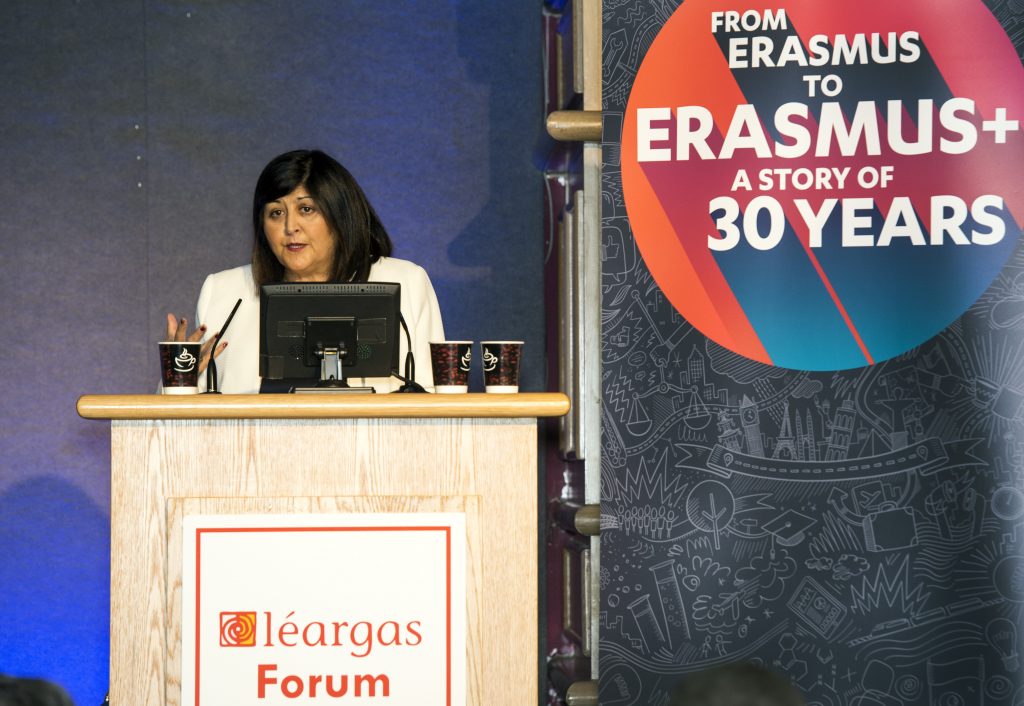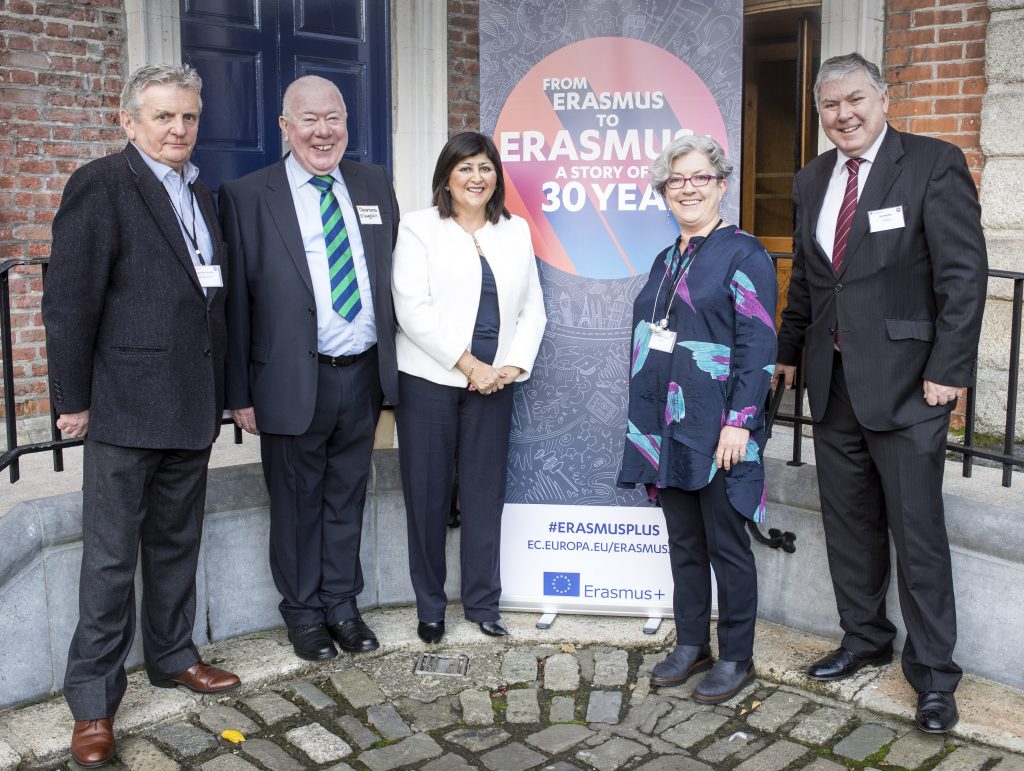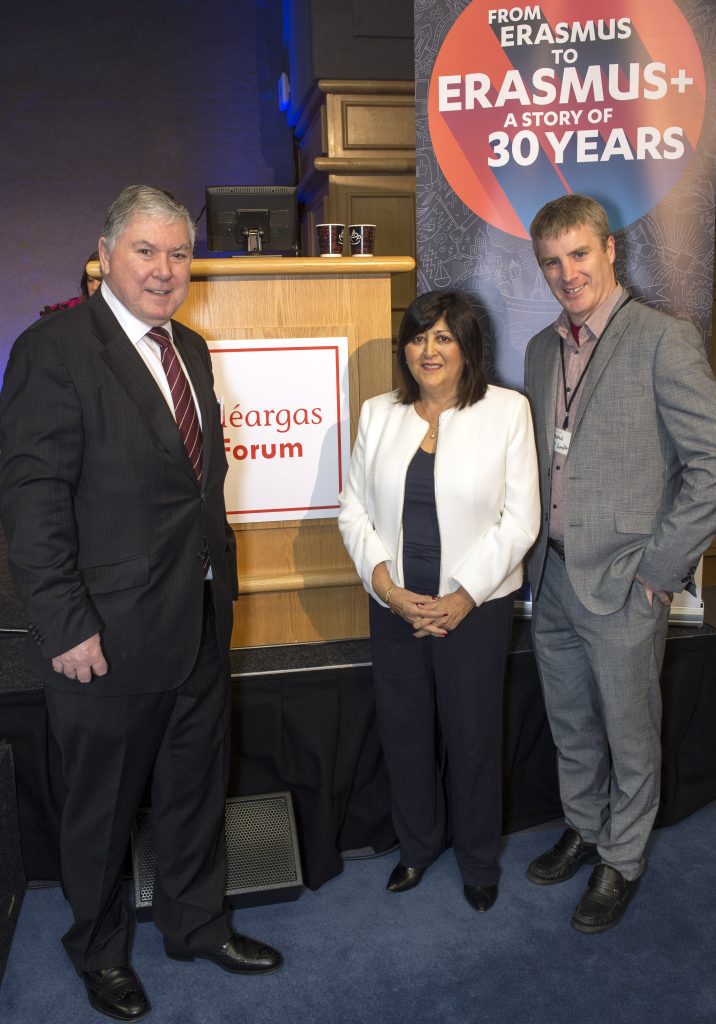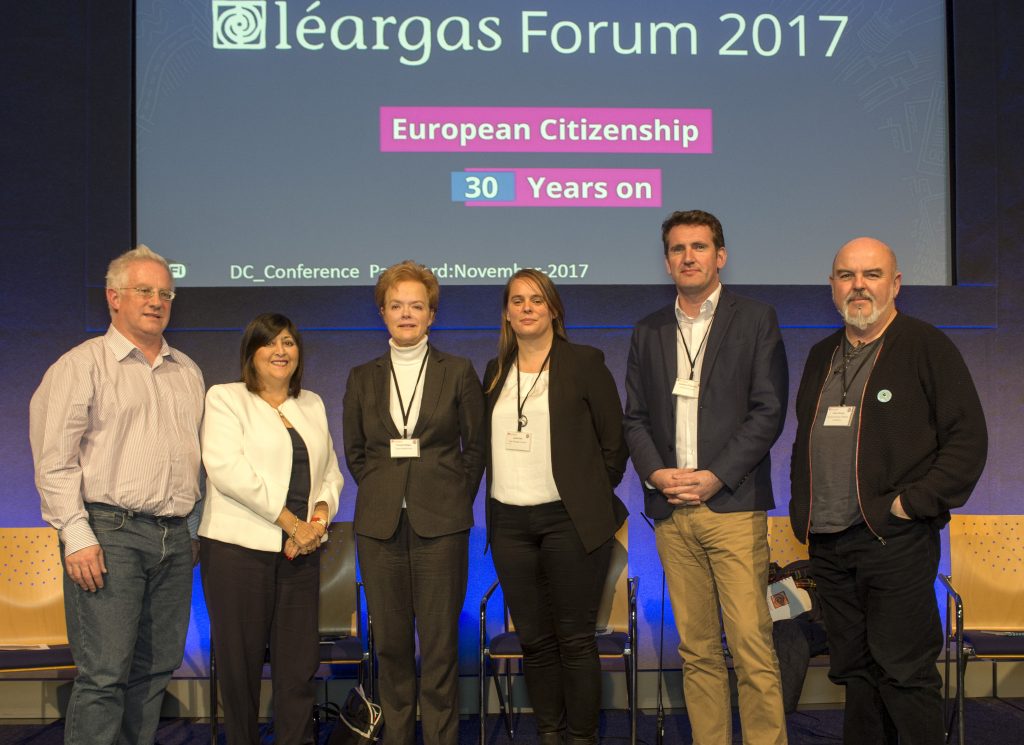Erasmus+ and European Citizenship, 30 Years On
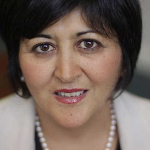 Our 2017 Léargas Forum celebrated the 30 years 'from Erasmus to Erasmus+' by recognising the remarkable achievements of Erasmus+, but also by exploring its relationship to European Citizenship and what that means today. Perhaps no-one is better qualified to reflect on this than our keynote speaker on the day, Barbara Nolan. Barbara is Head of Erasmus+ coordination in the Directorate General for Education and Culture in the European Commission. She has spent most of her career working in Brussels, but also headed the European Commission representation in Ireland from 2010 to 2016. Drawing on this experience, and as an Irish woman herself, her speech connected European policy and political developments with what they will mean for Ireland. This transcript of her remarks has been edited for clarity and length. Listen to the full speech on Soundcloud.
Our 2017 Léargas Forum celebrated the 30 years 'from Erasmus to Erasmus+' by recognising the remarkable achievements of Erasmus+, but also by exploring its relationship to European Citizenship and what that means today. Perhaps no-one is better qualified to reflect on this than our keynote speaker on the day, Barbara Nolan. Barbara is Head of Erasmus+ coordination in the Directorate General for Education and Culture in the European Commission. She has spent most of her career working in Brussels, but also headed the European Commission representation in Ireland from 2010 to 2016. Drawing on this experience, and as an Irish woman herself, her speech connected European policy and political developments with what they will mean for Ireland. This transcript of her remarks has been edited for clarity and length. Listen to the full speech on Soundcloud.
The Future of Europe and the Social Dimension
The debate about the future of Europe is in full swing. The European Commission launched the debate in March of this year with a White Paper giving several options for the future. President Juncker himself set out his own views for a stronger, united and more democratic Europe in his address in September.
The key feature of this debate is the need for stronger efforts to connect or reconnect with citizens and listen to their views, and better understand the challenges they face in their day to day lives. It’s fair to say that during the financial crisis the EU’s focus was really on trying to sort out the economy, and the social dimension of Europe was on the backburner. But I think following the Gothenburg Leaders’ meeting, the social dimension of Europe is very much back on the agenda. There was a proclamation of a new pillar of social rights at this summit, and (a reaffirmation of) the key role that education and training plays in getting more people into decent jobs, underpinning social cohesion, and forming a basis for active citizenship. The Commission also proposed the creation of a European Education Area by 2025.
So we can be optimistic for the future in terms of the importance of education, training and youth policy. We’re now only beginning to discuss the EU budget for the next seven year period (2021-2027). There’s a lot of issues to be sorted out, but there seems to be support for increasing budgets, support for education and training, and recognition that this has to be a key pillar of what the EU does in the future.
30 Years of Achievements, from Erasmus to Erasmus+
If there’s any one programme that really embodies the spirit of what it means to be a citizen of Europe, it has to be Erasmus. And when I say Erasmus I mean Erasmus+. I mean not just Higher Education but all the areas that we deal with: Vocational Training, Adult Education, Youth Policy…all the things that the ‘plus’ in Erasmus+ encompasses.
It is one of the most successful and iconic EU programmes. It has made its mark on both the private and professional lives of more than nine million people in Europe and beyond. We have over a million Erasmus babies, as we like to boast, which are the fruits of people mingling on Erasmus programmes and meeting their partners and spouses during their time abroad. It’s much more than a mobility programme: it also promotes transnational cooperation and exchange of good practice, and of course what we’re looking for is system changes. Where we see good practices elsewhere they should be brought back, introduced in other countries, upscaled where possible, in order to have real policy and system change.
(Erasmus+) has led to the internationalisation of education in a big way. Before Erasmus, it was only really the ‘happy few’ who were well off enough who had the opportunity to study abroad. It has opened up this possibility to millions of people who would not otherwise have had that chance.
All our surveys show that it helps young people find a job; Higher Education students double their chances of employment a year after graduation; vocational education students tend to find their first job faster and earn 25% more than their non-mobile peers. It promotes social inclusion. In the youth field for example, one out of three participants comes from a disadvantaged background. It has been accused of being elitist but we are really working hard to make it less and less so, and in the youth field I think it’s fair to say that it’s not elitist at all. It helps create a European identity; we’re not trying to make a European identity to replace national, regional or local identities, but we think that a European identity is something that can co-exist beside the other identities we have.
Ireland has been in the programme since it started in 1987, and has been contributing actively to its success. In 30 years almost 90,000 participants have benefitted and we look forward to opening up opportunities to even more Irish people.
Recommendations from the Mid-term Evaluation of Erasmus+
But in case you think we’re only interested in the good news side of Erasmus, we are also taking a critical look through our recent mid-term evaluation. Based on over a million responses – we have a huge amount of data because everybody who goes on Erasmus files a report –and on other surveys such as specific polls of organisations involved, we have found that Erasmus is extremely well known with a strong, positive image. It is frequently identified by citizens in Eurobarometer surveys as one of the key positive results of the European Union.
The programme delivers a unique package of results, not only for individuals but also for organisation and systems. And I mentioned that this is often one of the forgotten elements of Erasmus, that we are trying to also improve education and training systems by carrying out the various partnership projects. However, one of the things we found out is that much more could be made of the results of Erasmus+ by policy makers. This is a big challenge for us going forward; we have to try to talk to our Departments of Education and Employment to get these results mainstreamed into our education and training systems.
Another finding is that the range of possible learning experiences – formal, non-formal, informal – works, and should be kept. I don’t think we’ll see any of the parts of the current programme being abandoned as a result of this evaluation.
We found that there are very few overlaps with other programmes, but that more could be done to get, for example, the European Social Fund to upscale some of the good practices of Erasmus+ . When we’ve found something that works, it should be looked at by bigger funding instruments.
We all want more simplification – I personally would love more simplification as it’s a very complex programme for me as well as for the beneficiaries! So we are continuing to work on simplification, streamlining, online application forms, and other things to make the programme run better.
Other strategic recommendations we received were:
- Invest more in sectors that show good performance but receive less funding than, say, Higher Education. So that means invest more in Vocational Training and in Schools.
- Target organisations working with people with fewer opportunities, perhaps by having a simpler application form for amounts under a certain limit.
- Strengthen the impact at policy level by providing specific funding for national level exploitation of project results.
- More targeted action in the adult learning sector.
We’ll be taking these recommendations into account for the remainder of the current programme, as well as in the design of the new programme.
Further Engagement with Europe’s Citizens
The new European Solidarity Corps is a major political initiative launched by the President of the Commission to bring new opportunities to young Europeans. The Corps will support young people to volunteer or work on solidarity projects to help communities of people in difficulty throughout Europe. More than 42,000 young people have registered, and 500 of those are Irish. We hope that by the end of 2020 there will be over 100,000 people registered.
We’ve also set up a targeted action for unemployed young people, the ‘Youth Guarantee’. This was a commitment made in 2013 by all member states to ensure all young people under 25 receive either a job offer, continued training, an apprenticeship or an internship within four months of losing their job or finishing their studies. This is a very important measure and over 16 million young people have benefitted from this scheme. It is a kind of a safety net programme, and very important so that people don’t slip into long term unemployment and can keep moving, whether it’s upskilling or getting job experience. We don’t want to leave people behind once they finish their studies or lose a job.
Earlier I mentioned the need to reconnect with citizens and try to get them more involved in shaping EU policy. We’ve carried out thousands of Citizens’ Dialogues across Europe, and we’ve been particularly trying to reach out to young people to hear their voices, because we’re talking about a Europe that they will be left with over the future decades. So we really want their input and to get them involved.
We’re also trying to make it easier for the public to put issues that particularly concern them on the EU agenda. There’s a proposal to revise the European Citizens’ Initiative, where if you gather at least one million signatures you can invite the commission to legislate on a particular issue. We have proposed changes including lowering the minimum age for supporting an initiative to 16 from 18. This change would impact about 10 million young Europeans.
We’re also gearing up to renew the EU Youth Strategy post 2018. We’re spending a year listening to young people, we’ve conducted a new Eurobaromoter survey, and we’ve asked young people about their participation in organisations, in elections, in volunteering activities as well as their ideas on what the top priorities of the EU should be.
Interestingly enough, the surveys confirmed that young people are interested in European issues and tend to be positive about the EU. However their positive attitude and interest in Europe and politics does not always translate into political participation, or them becoming actively engaged in - for example - membership of political parties or turnout at elections.
It’s a real challenge to get young people to participate actively in political life and use the rights that they have. I think this new youth strategy will have participation as one of its core elements. We believe that young people need to have an opportunity to have their voices heard.
The Future of Erasmus+
I started off with Erasmus+ and will end by speaking about its future. The good news is that the signals are very positive coming out of the Gothenburg summit. At that summit it was mentioned that we’d like to double the number of participants in the programme, which obviously would mean a significant budget increase. It also means that we would be looking at new ways of engaging people, including looking at virtual exchanges.
We’re also planning to develop measures to help member states boost the level of skills, including basic and language skills. I understand that Ireland has a new Foreign Languages Strategy, and that’s a welcome move. Post-Brexit, Ireland will be very much linked to continental Europe and languages will be even more important in the future.
Another key objective will be reaching out to more learners coming from disadvantaged backgrounds. We’re already trying to do this, but it will be a key focus in the future.
Erasmus+ has and will continue to give young Europeans opportunities to live, work, study and train abroad. Before Erasmus+, there were very few opportunities of this nature. There’s nothing like the Erasmus+ programme anywhere else in the world - or if there is, we haven’t found it. I think we can be justifiably proud of what we have collectively built together.
Nevertheless we have a duty to make it better and refine it and we will be doing that as a result of the midterm evaluation and in the future programme. The coming year will be very decisive in terms of the content and scope of the future programme.
As EU Heads of State and Government declared in Bratislava in 2016, “The EU is not perfect but it is the best instrument we have for addressing the challenges we are facing. We need the EU not only to guarantee peace and democracy, but also the security of our people. And we need the EU to serve better their needs and wishes to live, work, study, move and prosper freely across our continent and benefit from our rich European cultural heritage.”
Images by Bernard van Giessen. We welcome contributions to 'Insights' at comms@leargas.ie.

